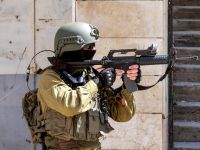The combination of a war-mobilized Hizbullah and a frustrated Israeli Army struggling to cope with the full-scale guerrilla war of the Palestinian intifada provide the elements for an “explosion of violence” along the Lebanon-Israel border, security sources warn.
The indications emerging from the South suggest that Hizbullah is prepared psychologically and materially for a renewed confrontation with the Israeli Army.
Timur Goksel, UNIFIL’s veteran spokesman and senior adviser, told the Lebanese Daily Star that despite the “apparent calm” in southern Lebanon, “all the elements for a flare-up are there.” “A misunderstanding by either side can easily result in a very serious escalation of violence,” Goksel said.
Furthermore, if Hizbullah continues its policy of responding to Israeli overflights by firing anti-aircraft rounds across the border, it could provide the Israeli Army with the “suitable provocation” for a “real rampage” through Lebanon, according to a Washington-based Middle East analyst.
“As misguided as such an operation might be, one shouldn’t underestimate the damage that could be caused by an enormously frustrated and powerful military backed by a prime minister who’s finding it harder and harder to rally his people,” the analyst said.
Hizbullah’s southern commander, Sheikh Nabil Qaouk, says the resistance is on constant readiness for any eventuality. “If it was not for Hizbullah’s presence along the border, Israel would have continued its aggressions (against Lebanon),” he told The Daily Star.
Hizbullah’s secretary-general, Sayyed Hassan Nasrallah, said last September that the party was “getting fully ready for direct militarily intervention from Lebanon.” A month earlier, Nasrallah called on his fighters to be in “a state of psychological, moral and material readiness to confront this challenge.”
Well-informed sources in the South have told The Daily Star that Hizbullah has stashed away a massive amount of weapons and munitions in the border district. One source referred to “truck after truckload” of weapons arriving in the south between May 2000 and December 2001. Another source said that Hizbullah has “more weapons now than they know what to do with.”
Even Israel’s overwhelming military superiority fails to worry Hizbullah. “We have something, they don’t,” a Hizbullah member said. “We seek martyrdom, they love life. We can endure suffering, they cannot.”
Hizbullah has been conducting training and weapons testing for months in areas close to the border with Israel. Hizbullah is believed to have prepared a detailed contingency plan in the event of an outbreak of large-scale cross-border hostilities.
The Daily Star has been told that one of the proposed schemes apparently calls for the seizure of an Israeli border settlement in the event of a serious escalation. The purpose is to hold the residents hostage in a bid to limit Israel’s military options.
Saudi Plan
Meanwhile on Wednesday, Hizbullah cautioned that participants in this month’s Arab League summit should steer clear of territorial concessions and focus instead on exposing Israeli crimes and supporting the intifada.
Hizbullah’s stand was voiced by the party’s deputy secretary-general, Sheikh Naim Qassem, during a rally in Shiyah, which came a day after Syrian President Bashar Assad voiced support for Abdullah’s initiative after talks in Riyadh.
Qassem decried “Arab silence toward the daily massacres committed by Israel, even though television screens are exposing vivid details of the extent of massacres.”
“We have to keep exposing in all forums Israel’s terrorist actions,” he said, calling on Arab leaders to press for the “an end to Israel’s violations of human rights and the elimination of its nuclear warheads and other lethal weapons, which are deployed to kill (the Palestinians) at the instructions of America and with its blessings.”
“The Arab League, which will meet in Beirut, is responsible for rallying support for the resistance and the intifada. It must condemn Israeli and Arab terrorism, and stand firmly against attempts to force compromises with regard to the occupied lands and Arab sanctities.” (Albawaba.com)







